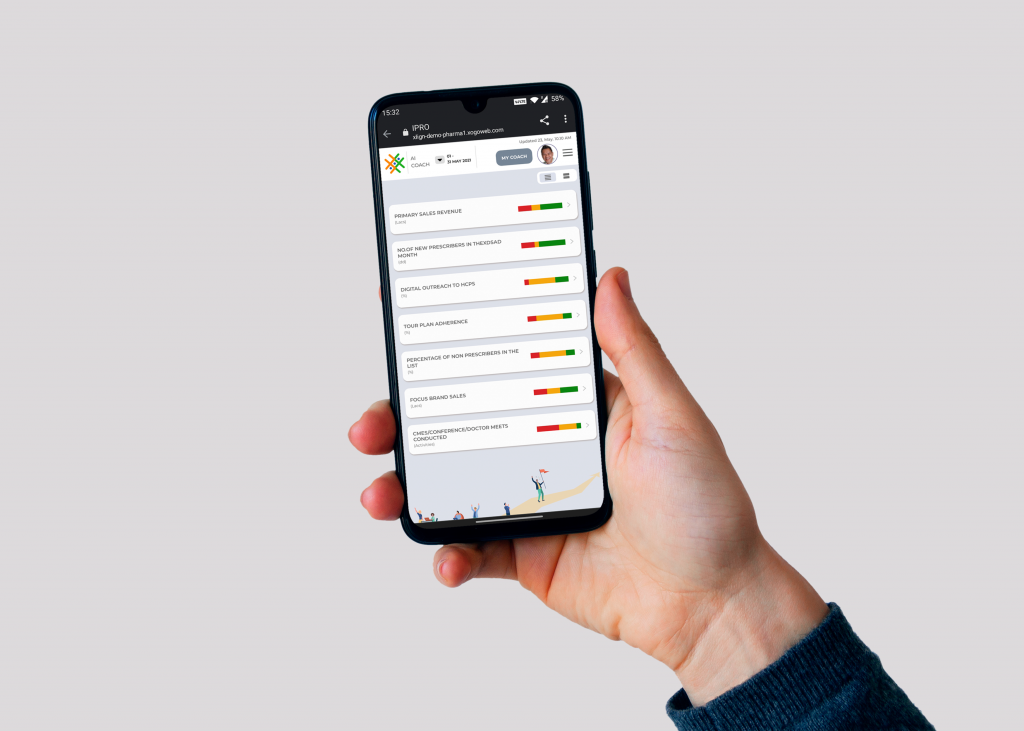Pharma sales teams are no strangers to technology. Right from the early 2000s, sales teams have adopted a host of tools. They’ve adopted CRMs, deal tracking and contact management software, sales automation tools, scheduling software and much more. This has helped pharma sales teams streamline their processes and develop healthy sales systems. But it hasn’t helped sales effectiveness as much.
Most technology in the pharmaceutical sales space is geared towards the process of selling rather than the person who sells.

Even technology designed for sales reps are sales playbooks/ best practices that make workflow smoother. But it tends to ignore the individual – their unique motivations and behavior.
You and I, unlike machines, don’t respond to a standard set of instructions in the same way every time. Yet sales tech doesn’t acknowledge it, until now.
With the advent of AI, there are plenty of tools that mimic human interaction like chatbots. But the real power is when AI gets a soul. We like to call it Behavior Intelligence – when AI doesn’t only sound like a human, but can act like one and understand other people’s behavior too.
This article explores behavior intelligent AI and how pharma teams can use it to improve their sales force effectiveness.
How can you improve pharma sales effectiveness
Help your team take action
Most tech provides sales reps with plenty of data on interactions with customers. This gives them insights on where the gaps in their performance lie. But it assumes that sales reps will make the leap from knowledge to action. And that once they know where they fall short, they will know what to do and be motivated to do it.
That this is often not the case, as behavior science tells us. That’s why all our knowledge about healthy eating doesn’t stop us from reaching for the fries. Sales reps need a view of their performance, so they can take ownership of it. And they need an environment that encourages them to take action.
Help your team overcome Reactance

One environment that actually discourages action is a typical command-control type work environment.
This is because of a psychological phenomenon called Reactance. This is the push back people feel when someone tells them to do something. It instantly signals a loss of freedom of choice to the brain, and is met with resistance.
In 2008, Nobel Economist Richard Thaler and Harvard professor Cass Sunstien wrote about creating choice architecture in their award-winning book called Nudge. They put forward the idea that nudges could be used to help people make better choices.

These nudges design and present choices in a way that leaves the decision open, yet encourages the most positive action. Like these famous examples or this one.
For instance, it’s crucial for Pharma sales reps to update their CRMs regularly. In spite of simplifying the process with automation tools like “voice updation”, reps still fall behind on this behavior. However, pharma teams using behavior levers like building consistency through ‘streaks’, personalized reminders etc. see more success, with CRM updation improving by up to 15%.
Focus on your Sales Managers
According to Gallup’s latest survey, 70% of employee engagement depends on their managers. Pharma sales leaders looking at improving their sales force effectiveness need to start with their managers, who have the most dramatic impact on their teams.
The real effectiveness of a manager lies in their human skills like empathy, understanding people, communicating value and inspiring their teams. This is why they can never be replaced by AI.
But these qualities are increasingly buried under reports and other administrative tasks. Managers barely get to spend any time actually building their team up with timely feedback and regular pats on the back.
How can Behavior Intelligent Software help?
Reframe Insights Using Nudges
But, how do you get your entire set of supervisors and managers to constantly think along these lines. Or personalize every communication?

You can use a behavior intelligent sales coach. The AI coach’s core is behavior principles which it uses to build engaged and motivated teams.
From designing the sales rep’s interactions with their performance, to visual nudges that communicate support and deliver timely feedback, the AI coach personalizes each step to individual sales reps. Behavior design builds a competitive and exciting environment that leads to action, every time.
Armed with insights into their own behavior, reps are able to make better decisions. This helps them take control of their own performance.
Amplify your Managers to be Coaches
Behavior Intelligent AI can come alongside a manager, helping them with the behavior data. It can highlight individuals who need help, and those who could use a pat on the back. With a click, the manager can take action. The AI ensures that the message is timely, personalized and impactful.
Now, busy managers can get an overview of their team’s performance. Behavior dashboards highlight key insights on individuals and the team’s overall performance.

Overwhelmed managers can use AI to amplify their relationship with the team and build a more effective team.
Conclusion
Behavior intelligent AI can scale up the best of our human qualities. Thus making the experience at work truly engaging and motivating.
Read how this $10 pharma giant used Behavior Intelligence to improve their teams engagement and motivate them to action. Within a year, they saw pharma sales reps spend 48% more time on outreach meetings. Teams increased average detailing time by 34% for big brands. And there was a 28% increase in digital doctor coverage. Click here to read more.
The secret to improving Pharma sales force effectiveness is to celebrate the humanness of your team. And boost it with behaviorally intelligent software.
worxogo Nudge Coach is the world’s first Behavior Intelligent AI. Find out how it can help your teams.


